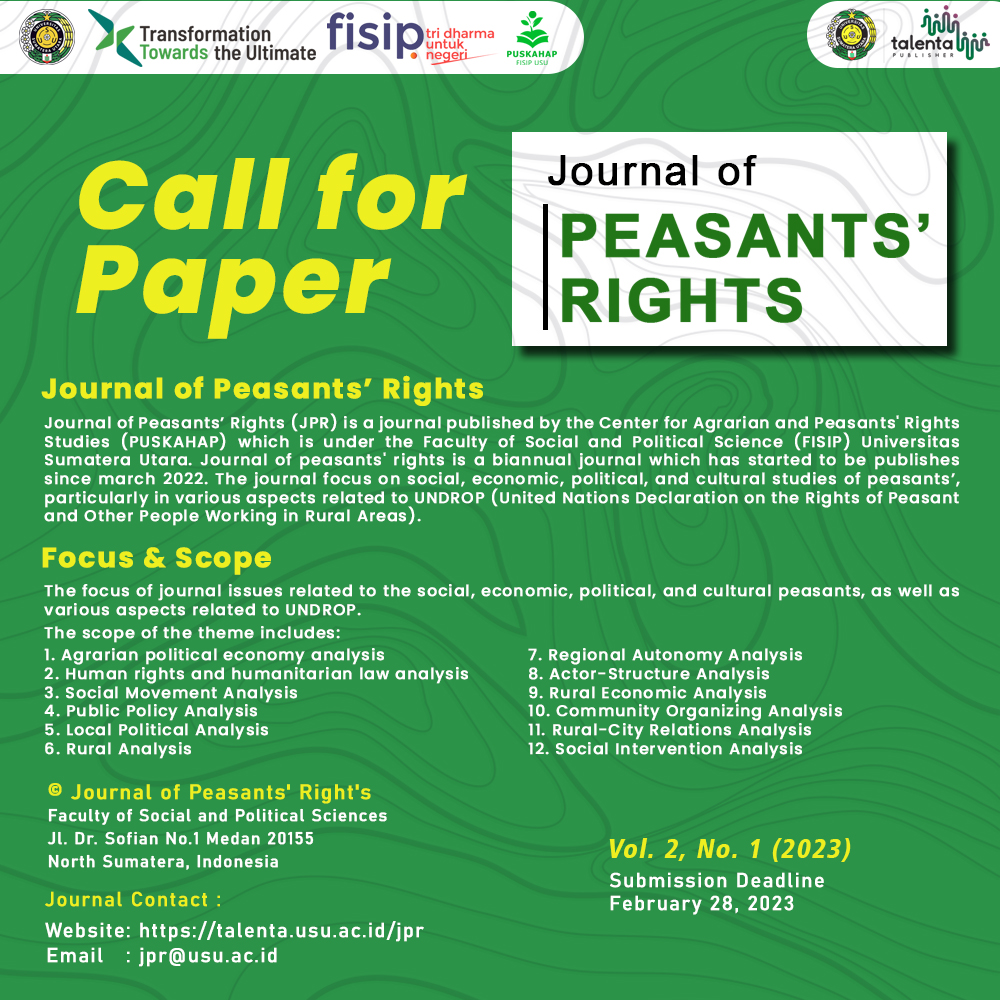Understanding Agrarian Reform in Colombia: The Story from a Field Visit during the International Land Grabbing Conference 2024
DOI:
https://doi.org/10.32734/jpr.v3i1.16542Keywords:
Agrarian Reform, Peasant, ColombiaAbstract
During the International Land Grabbing Conference 2024 in Colombia, the authors had the opportunity to visit two sites of agrarian reform struggle in the Department of Cundinamarca, where efforts to curb land grabbing are being implemented: the San JoaquÃn Farm in the municipality of Puerto Salgar, and the Zona Reservo Campesino in the municipality of Venecia. Given the long-standing history of agrarian issues in Colombia and the hopeful political will of the current Colombian president, it is intriguing to discuss the authors' findings from this field visit to understand the achievements in the implementation of agrarian reform in Colombia, as well as the challenges faced in resolving agrarian issues confronted by farmers and rural communities. Based on observations, it is evident that the success of agrarian reform implementation relies on the political will of the government and efforts to involve farmer organizations, as well as addressing policy barriers. A state-centered approach, with the involvement of social actors such as farmer organizations and NGOs, can overcome structural and institutional obstacles. Furthermore, sustainable livelihoods for farmers must be prioritized, considering the cultural and historical context of the farmers and the need for balanced resource management with a subjective approach to agricultural organization, which can facilitate farmer regeneration and the success of agrarian reform in Colombia.
Downloads
References
Albertus, M., & Kaplan, O. (2013). Land reform as a counterinsurgency policy: Evidence from Colombia. Journal of Conflict Resolution, 57(2), 198-231.
Borras, S. M. (2001). State–society relations in land reform implementation in the Philippines. Development and change, 32(3), 545-575.
Borras, S. M. (2003). Questioning marketâ€led agrarian reform: Experiences from Brazil, Colombia and South Africa. Journal of agrarian change, 3(3), 367-394.
Camargo, A. (2022). Imagined transitions: agrarian capitalism and climate change adaptation in Colombia. The Journal of Peasant Studies, 49(4), 713-733.
Feder, E. (1979). Regeneration and degeneration of the peasants: Three views about the destruction of the countryside. Social Scientist, 3-41.
Flores, T. E. (2014). Vertical inequality, land reform, and insurgency in Colombia. Peace Economics, Peace Science and Public Policy, 20(1), 5-31.
Gabay, Aimee. (2024). New agrarian courts in Colombia raise hopes for end to land conflicts. In Mongabay. Available: https://news.mongabay.com/2024/02/new-agrarian-courts-in-colombia-raise-hopes-for-end-to-land-conflicts/
Harrison, M. (1977). The peasant mode of production in the work of AV Chayanov. The Journal of Peasant Studies, 4(4), 323-336.
Kleinübing, T. (2024). Territories in Transformation: Challenges and Perspectives in Sustainable Space Planning and Planning. Revista Foco, 17(2).
Kurtenbach, S. (2024). Variations of Peace in Colombia. Journal of Intervention and Statebuilding, 1-18.
Lanzona Jr, L. A. (2019). Agrarian reform and democracy: Lessons from the Philippine experience. Millennial Asia, 10(3), 272-298.
Levine-Drizin, Gabe and MartÃnez-Osorio, Margarita. (2022). Under Petro, Hope for Rural Reform in Colombia. In Nacla. Available: https://nacla.org/under-petro-hope-rural-reform-colombia
Liamzon, C. (1996). Agrarian reform. Development in Practice, 6(4), 315-323.
Melo, J. B. (2015). The intersection of race, class, and ethnicity in agrarian inequalities, identities, and the social resistance of peasants in Colombia. Current Sociology, 63(7), 1017-1036.
Mondragón, H. (2006). Colombia: Agrarian reform-fake and genuine. Promised land: Competing visions of agrarian reform, 165-176.
Reis, E. P. (1998). Brazil: One hundred years of the agrarian question. International Social Science Journal, 50(157).
Robles, W. (2018). Revisiting agrarian reform in Brazil, 1985–2016. Journal of Developing Societies, 34(1), 1-34.
Rosset, P. (2013). Re-thinking agrarian reform, land and territory in La Via Campesina. Journal of Peasant Studies, 40(4), 721-775.
Sarmiento Salazar, L. (2024). Embroidery and textile narratives as community resilience in a group of women weavers in the village of San Miguel (Colombia).
Scoones, I. (1998). Sustainable rural livelihoods: a framework for analysis (Vol. 72, pp. 1-22). Brighton: Institute of Development Studies.
Thomson, F. (2011). The agrarian question and violence in Colombia: conflict and development. Journal of Agrarian Change, 11(3), 321-356.
Vásquez, M. S. (2023). Land Inequality, Agrarian Development and Peace in Colombia: A Political Ecology View.
Wang, C., Zhang, Y., Yang, Y., Yang, Q., Kush, J., Xu, Y., & Xu, L. (2016). Assessment of sustainable livelihoods of different farmers in hilly red soil erosion areas of southern China. Ecological Indicators, 64, 123-131.
Wolford, W. (2010). Participatory democracy by default: Land reform, social movements and the state in Brazil. The Journal of Peasant Studies, 37(1), 91-109.






